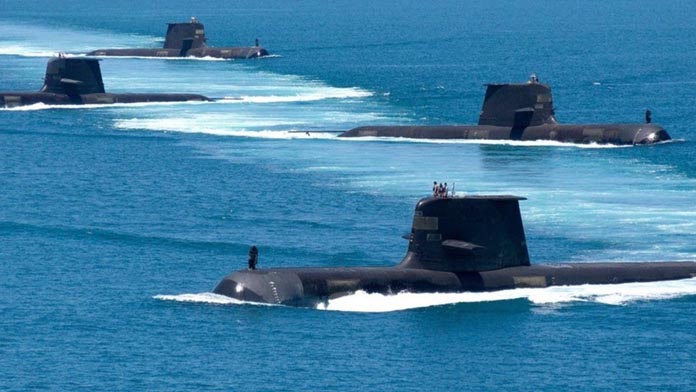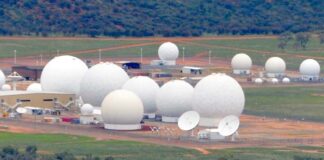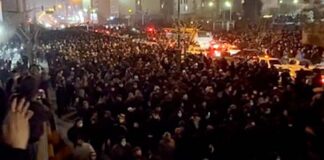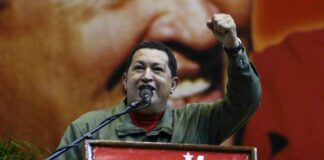The confrontation between the US and China is escalating. The world is now closer to open war between two nuclear-armed superpowers than for many decades.
This is a terrifying prospect. Yet the Australian government is helping boost the chance of war through belligerent rhetoric against China, alongside its largest military build-up since the Second World War.
In September the Morrison government announced the AUKUS pact with the US and UK, aimed squarely at confronting China. Building opposition to this warmongering is an urgent task.
Under AUKUS, Australia will acquire a fleet of nuclear submarines, becoming only the seventh country in the world to do so.
Australia will also see an increase to the 2500 US troops that already rotate through Darwin, building four new facilities there, plus deployments of US warplanes including bombers, and an increased US naval presence.
AUKUS will also lock in increased co-operation on artificial intelligence and cyber warfare.
Last week Defence Minister Peter Dutton used a National Press Club speech to further stoke anti-China hysteria. He warned that, “Every major city in Australia, including Hobart, is within range of China’s missiles,” and declared that Australia would join the US if it launched a war with China over Taiwan.
Sink the nuclear subs deal
The acquisition of nuclear subs is particularly dangerous.
The subs are part of an aggressive and dangerous strategy of encircling China. In the event of a war, they would aim to destroy or pin down China’s own submarines, including those armed with nuclear warheads, close to the Chinese coast. This makes fighting a war with China more attractive.
Nuclear subs are harder to detect than conventional submarines and can remain submerged on patrol for much longer, making them perfect for launching sudden missile strikes.
The subs will cost in excess of $100 billion. We face a climate crisis, record low wage growth and an ongoing global pandemic. But Morrison’s priority is to pour money into a destructive drive to war.
This huge military expenditure will mean schools, hospitals, universities and other essential public services will continue to be starved while arms manufacturers line their pockets.
Morrison claims the plan to build the subs in Australia will create jobs. But if the money was used to fund a rapid transition to 100 per cent renewable energy, it would create at least 130,000 climate jobs over ten years.
Every other nation that has nuclear subs also has nuclear power stations and nuclear weapons. So this opens the possibility of Australia pursuing them too. As Greens leader Adam Bandt says, AUKUS “puts floating Chernobyls in the heart of Australian cities”.
International solidarity, not nationalism
Some, including former Prime Minister Paul Keating, have opposed AUKUS on nationalist grounds, arguing that Australia is “forfeiting control” of its military and doing “the bidding of another great power”.
This is wrong. AUKUS is the latest instalment in a long history of Australian governments actively instigating and participating in conflicts, both local and far flung, in order to secure profitable trade and world-power backing for Australia’s regional mini-empire.
The Australian military dominates the South Pacific, dispatching troops and bullying the island nations such as East Timor, PNG, the Solomon Islands and Nauru. Its effort to steal Timor’s oil wealth following the 1999 intervention shows how it uses its power to boost the profits of Australian companies.
Some in the campaign against AUKUS have been reluctant to raise the demand of “no war on China”, arguing we may need to defend Australia in future.
This means accepting another version of Australian militarism—like that of defence strategist Hugh White, another opponent of AUKUS. He argues that we need a larger number of conventional subs, telling the Nine papers, “You would sink more enemy ships with 24 boats than you would with eight nuclear-powered ones.”
But ordinary people have no interest in fighting our rulers’ wars in defence of empire and corporate profits.
Nor does China have any interest in an invasion of Australia—or the ability to stage one.
We need to build common cause against militarism and war between workers in China and in Australia. Lining up behind our own government’s militarism only strengthens the hold of China’s rulers over their own people. The threat of external enemies has already been used as a pretext to crack down on union organising in China.
Any conflict with China could escalate into a disastrous exchange of nuclear weapons. Everyone should join the national weekend of protest against AUKUS, the nuclear subs and war with China taking place around the country on 9-11 December.
Unions, anti-nuclear campaigners and socialists need to fight to leave AUKUS and the push for war on China dead in the water.
By Adam Adelpour
Join the national weekend of protest
Wollongong Thursday 9 December | 6:30pm | 6-8 Wentworth St, Port Kembla
https://fb.me/e/VqkOm7lw
Brisbane Friday 10 December | 4pm | Reddacliff Place
https://fb.me/e/1f3TuPyJX
Canberra Friday 10 December | 5:30pm | Venue TBC
Melbourne Friday 10 December | 5.15pm | State Library of Victoria
https://fb.me/e/1aXyDbITM
Sydney Saturday 11 December | 12pm | Sydney Town Hall
https://fb.me/e/1jB35aogV
Melbourne Saturday 11 December | 1pm | State Library of Victoria
https://fb.me/e/3gSqywPkP
Adelaide Saturday 11 December | 2pm| Parliament House Steps, North Terrace https://fb.me/e/YGBjHaki






